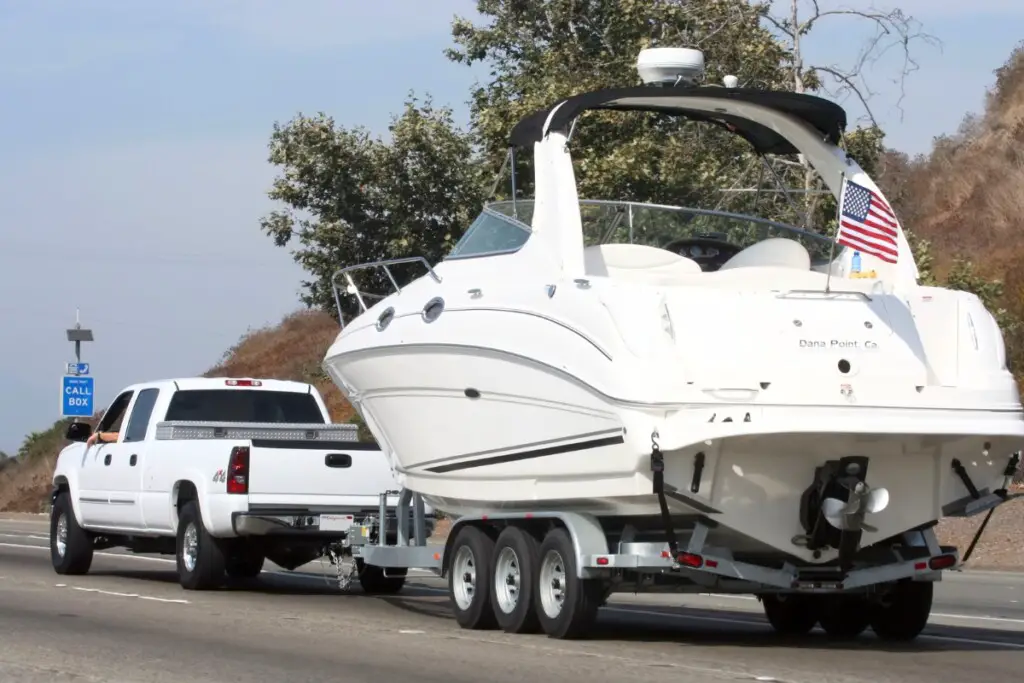Ahoy, matey! Let’s dive into the fascinating world of boat weights, including 12 boat types, their lengths, and matching them with the appropriate trailers and towing vehicles.
You might be wondering, “How much does a boat weigh?”
Well, the answer isn’t quite as simple as you might think. Boats come in all shapes and sizes, and their weights can vary significantly depending on the type, size, and materials used.
In this article, we’ll explore the wide range of boat weights and discuss the types of trailers and vehicles you’ll need to tow your aquatic adventure machine. So, grab your life vest and let’s set sail!
| Boat Type, Weight, and Length | Appropriate Trailer Type | Appropriate Towing Vehicle |
|---|---|---|
| Dinghies and Small Sailboats (100-1,000 lbs, 8-20 feet) | Single Axle | Small Car or Larger |
| Aluminum Row Boats (100-500 lbs, 10-20 feet) | Single Axle | Small Car or Larger |
| Personal Watercraft (PWC) (400-1,000 lbs, 8-12 feet) | PWC Trailer | Small Car or Larger |
| Bass Boats (1,500-2,500 lbs, 16-22 feet) | Single or Tandem Axle | SUV or Larger |
| Bowriders (3,000-5,000 lbs, 18-30 feet) | Tandem Axle | Large SUV or Truck |
| Cuddy Cabin Boats (2,500-4,000 lbs, 18-25 feet) | Tandem Axle | Large SUV or Truck |
| Pontoon Boats (1,500-5,000 lbs, 16-30 feet) | Single or Tandem Axle, Depending on Weight | Mid-Sized SUV to Large Truck Depending on Weight |
| Cabin Cruisers (6,000-12,000 lbs, 25-40 feet) | Tandem or Triple Axle | Large Truck |
| Sailboats (4,000-20,000+ lbs, 20-50+ feet) | Tandem or Triple Axle | Large Truck or Specialized Transport |
| Yachts (30,000+ lbs, 40-100+ feet) | Specialized Transport | Specialized Transport |
| Speedboats (2,500-7,000 lbs, 20-35 feet) | Single or Double Axle | Large SUV to Large Truck |
| Houseboats (15,000-50,000+ lbs, 40-75+ feet) | Specialized Transport | Specialized Transport |
How Much Do Boats Weight by Type
- Dinghies and Small Sailboats (100-1,000 lbs, 8-20 feet) These lightweight boats are perfect for beginners or casual boating enthusiasts. Due to their minimal weight, you can easily tow them with a small car or SUV. No need for a beefy truck or specialized trailer here! A simple single-axle trailer will suffice.
- Aluminum Row Boats (100-500 lbs, 10-20 feet) Aluminum row boats are durable and lightweight, making them easy to transport. A small car or SUV can handle towing these boats with a basic single-axle trailer.
- Personal Watercraft (PWC) (400-1,000 lbs, 8-12 feet) Jet skis and other personal watercraft are popular choices for those seeking a thrilling experience on the water. They’re relatively light, so towing them shouldn’t be a problem for most vehicles. A simple PWC trailer should do the trick.
- Bass Boats (1,500-2,500 lbs, 16-22 feet) Bass boats are designed for fishing in shallow waters, and their sleek design allows for easy maneuverability. They typically weigh between 1,500 and 2,500 lbs, meaning a midsize SUV or truck can tow them with ease. A single-axle or tandem-axle trailer will work well for these boats.
- Bowriders (3,000-5,000 lbs, 18-30 feet) Bowriders are versatile boats with an open bow area for seating. They’re perfect for a day of fun with family and friends. Weighing between 3,000 and 5,000 lbs, you’ll need a larger SUV or truck to tow these boats. A tandem-axle trailer will be the best choice for these vessels.
- Cuddy Cabin Boats (2,500-4,000 lbs, 18-25 feet) Cuddy cabin boats offer a small sheltered area with limited sleeping accommodations, making them a popular choice for day trips and weekend getaways. They generally weigh between 2,500 and 4,000 lbs (dry), and a larger SUV or truck with a tandem-axle trailer is recommended for towing. Link leads to article dedicated solely to cuddy cabin boat weights.
- Pontoon Boats (1,500-5,000 lbs, 16-30 feet) Pontoon boats are known for their stability and spaciousness, making them excellent choices for leisurely cruises or parties on the water. Depending on the size, you may need anything from a midsize SUV to a full-size truck for towing. A tandem-axle trailer is commonly used for these boats.
- Cabin Cruisers (6,000-12,000 lbs, 25-40 feet) Cabin cruisers offer a comfortable space for overnight stays and often come with amenities like a small kitchen and bathroom. Due to their size and weight, you’ll need a heavy-duty truck and a sturdy boat trailer with tandem or triple axles to tow these vessels.
- Sailboats (4,000-20,000+ lbs, 20-50+ feet) Sailboats can vary greatly in weight, depending on their size, hull material, and rigging. Smaller sailboats weighing 4,000-8,000 lbs can be towed with a full-size truck, while larger, heavier sailboats may require specialized transport. A tandem or triple-axle trailer is necessary for these boats.
- Yachts (30,000+ lbs, 40-100+ feet) Yachts are the epitome of luxury on the water. Due to their massive size and weight, they typically require professional transport, either by water or by specialized land trailers. Towing a yacht isn’t a job for your everyday vehicle!
- Speedboats (2,500-8,000 lbs, 20-35 feet) Built for speed and excitement, these boats can vary significantly in weight. Smaller speedboats might be towed by a midsize SUV, while larger, more powerful models will require a full-size truck or even a heavy-duty truck to handle the load.
- Houseboats (15,000-50,000+ lbs, 40-75+ feet) Houseboats are like floating homes, offering all the comforts of a house on the water. Due to their immense size and weight, houseboats usually require specialized equipment and professional services to transport them.
Understanding Dry Weight
When discussing boat weights, it’s essential to differentiate between a boat’s dry weight and its total weight when fully loaded.
The dry weight refers to the weight of the boat without any additional gear, fuel, or passengers. It’s the base weight of the boat, which includes the hull, engine, and essential onboard equipment.
However, dry weight does not account for the weight of items that are often added to the boat, such as personal belongings, provisions, or optional equipment.

Heaviest Items to Consider
When calculating the total weight of your boat, it’s crucial to consider the weight of all the items you’ll be bringing on board. Some of the heaviest items that can significantly impact the total weight of your boat include:
- Fuel: Gasoline and diesel fuel can weigh a lot, especially when you have large fuel tanks. Gasoline weighs roughly 6.1 lbs per gallon, while diesel weighs around 7.1 lbs per gallon. Take note of the capacity of your fuel tank and do the math.
- Water: Drinking water and water for onboard systems (such as sinks and showers) can add a significant amount of weight to your boat. Water weighs approximately 8.3 lbs per gallon. Take note of the capacity of your water storage on board and do the math.
- Waste Tanks: If your boat is equipped with a marine toilet and waste holding tank, the weight of the wastewater can also add up. This weight will vary depending on the size of your tank and how full it is.
- Batteries: Each marine battery on board will likely add an additional 60-75 pounds.
- Gear and Equipment: Items such as anchors, ropes, life jackets, coolers, ice, fishing gear, and other personal belongings can quickly add weight to your boat.
- Passengers: Don’t forget to account for the weight of passengers and pets when calculating your boat’s total weight.
When determining the towing capacity required for your boat, it’s important to consider the total weight, including all the additional items you’ll be carrying on board. By taking these factors into account, you’ll be better prepared to safely tow and operate your boat within its specified weight limits.
Boat Trailer Weight Ranges Based on Axles
Boat trailers come with different axle configurations that affect their weight capacities. The number of axles determines the overall weight a trailer can safely carry. Here’s a general overview of boat trailer weight ranges based on the number of axles:
- Single-Axle Trailers: Single-axle trailers are typically designed for smaller boats and have a weight capacity ranging from 1,500 to 3,500 pounds. They’re suitable for towing lightweight boats such as aluminum fishing boats, jet skis, or small sailboats. Single-axle trailers are generally more maneuverable, easier to handle, and more cost-effective than trailers with multiple axles.
- Tandem-Axle Trailers: Tandem-axle trailers, which have two axles, offer increased stability and can handle larger, heavier boats. These trailers can typically support boats weighing between 3,500 and 7,000 pounds. Tandem-axle trailers are ideal for towing medium-sized boats like ski boats, pontoon boats, or small to mid-sized cabin cruisers.
- Tri-Axle Trailers: Tri-axle trailers feature three axles, providing even more stability and support for larger, heavier boats. They can typically accommodate boats weighing between 8,000 and 18,000 pounds or more. These trailers are suitable for towing large boats such as houseboats, larger cabin cruisers, or yachts.
It’s essential to choose the right trailer for your boat based on its weight, including the additional weight of gear, fuel, and water. Always consult the trailer manufacturer’s specifications and recommendations to ensure safe and proper towing.

Common Vehicle Types and Their Towing Capacity Ranges
Different vehicles have varying towing capacities, which determine the maximum weight they can safely tow. Here’s a general breakdown of common vehicle types and their towing capacity weight ranges:
- Compact Cars: Most compact cars have a limited towing capacity of around 1,000 to 2,000 pounds. These vehicles are suitable for towing small boats, such as jet skis or aluminum rowboats.
- Sedans: Midsize and full-size sedans typically have a towing capacity ranging from 2,000 to 3,500 pounds. This allows them to tow small boats like aluminum fishing boats, small sailboats, or lightweight personal watercraft.
- Crossovers and Small SUVs: Crossovers and small SUVs usually have a towing capacity between 3,000 and 5,000 pounds. This capacity makes them suitable for towing small to medium-sized boats, such as bass boats, ski boats, or smaller speedboats.
- Midsize and Full-Size SUVs: These vehicles have a higher towing capacity, generally between 5,000 and 8,000 pounds. Midsize and full-size SUVs can tow larger boats, like cabin cruisers or cuddy cabin boats, and may even be able to handle some pontoons and wakeboarding boats.
- Pickup Trucks: Pickup trucks are known for their powerful engines and substantial towing capacities. Light-duty pickup trucks can tow between 5,000 and 12,000 pounds, while heavy-duty trucks can handle anywhere from 12,000 to 30,000 pounds or more. These trucks are capable of towing larger boats, such as larger cabin cruisers, houseboats, and even some yachts.
It’s crucial to consult your vehicle’s owner’s manual or contact the manufacturer to verify the specific towing capacity of your vehicle. Remember that towing a boat safely requires a combination of the right vehicle, proper trailer, and appropriate hitch.
Also remember that once you get to the water you’ll be backing up your vehicle down a ramp and into the water, so you’ll need the brakes and vehicle capability of dealing with that. It’s not just highway driving that you need to think about.

Final Takeaways
The weight of a boat can vary greatly depending on its type, size, and materials used in its construction. When towing a boat, it’s essential to have the appropriate trailer and vehicle to ensure safe and efficient transportation. By understanding the different boat weights and towing requirements, you’ll be better equipped to choose the perfect setup for your aquatic adventures.
Happy Boating!
